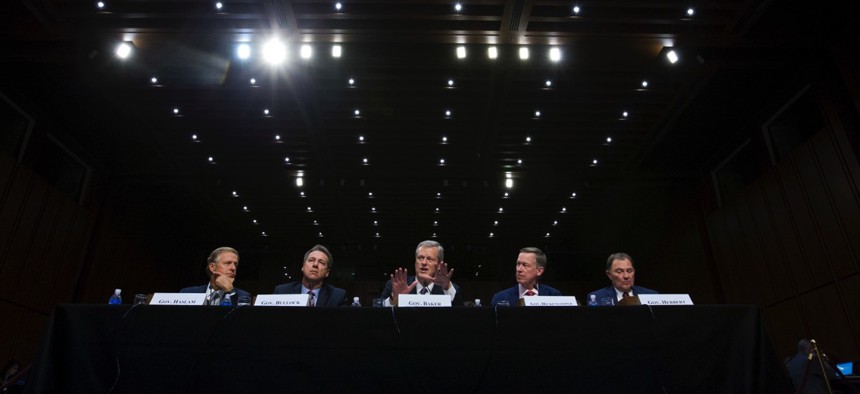Governors Back Bipartisan Senate Plan to Stabilize Health Markets

Governors from left; Bill Haslam of Tennessee, Steve Bullock of Montana, Charlie Baker of Massachusetts, John Hickenlooper of Colorado and Gary Herbert of Utah speak at a Senate hearing on Thursday, Sept. 7, 2017. (AP Photo/Jose Luis Magana)
Three Republicans and two Democrats teamed up to urge the Senate to act quickly.
A bipartisan group of governors has become the latest to take a stand in support of an effort by U.S. Senate leaders on both sides of the aisle to control health insurance costs and stabilize the individual health insurance market.
In testimony before the Senate Health, Education, Labor and Pensions Committee on Thursday, five governors—Republicans Bill Haslam of Tennessee, Charlie Baker of Massachusetts and Gary Herbert of Utah, and Democrats Steve Bullock of Montana and John Hickenlooper of Colorado—threw their support behind a bill that would continue the federal payments to insurance companies that are built into the Affordable Care Act for a year or more.
These payments, which add up to about $7 billion annually, help lower the cost of deductibles and out-of-pocket expenses for millions of low-income Americans.
The move puts these governors in direct conflict with President Trump, who has threatened—on Twitter, and otherwise—to end the these cost-sharing reduction payments, which he has described as “bailouts.” Representatives of the insurance industry have pushed back against that categorization.
An analysis by the Congressional Budget Office released in early August found that termination of these payments would not necessarily have the desired impact on federal spending. Because the premium tax-credit subsidies that are built into Obamacare automatically adjust in proportion to premium costs, to limit individual consumers’ exposure to those costs, the federal government would essentially still be footing the bill for any increases in premium price.
The federal government would therefore be increasing its spending on these tax subsidies in order to cover the predicted 20 percent increase in cost for silver plans. The CBO estimates that this could cost the government as much as $194 billion over the next decade—roughly twice the amount the government would spend if they simply stuck with the payment plan.
The bill under consideration is a compromise by the committee chairman, Sen. Lamar Alexander, a Republican, and the senior Democrat on the panel, Sen. Patty Murray. Republicans would allow the subsidies to insurance companies to continue and Democrats would give state governments more control over some Obamacare insurance coverage requirements, a point that is also a draw for many governors.
However, if the Senate is going to act, it must act quickly. The Centers for Medicare and Medicaid Services must file their 2019 rate requests for Obamacare plans on Sept. 20.
Quinn Libson is a Staff Correspondent for Government Executive’s Route Fifty based in Washington, D.C..
NEXT STORY: ABC Cops Use Apps to Spot Fake IDs






